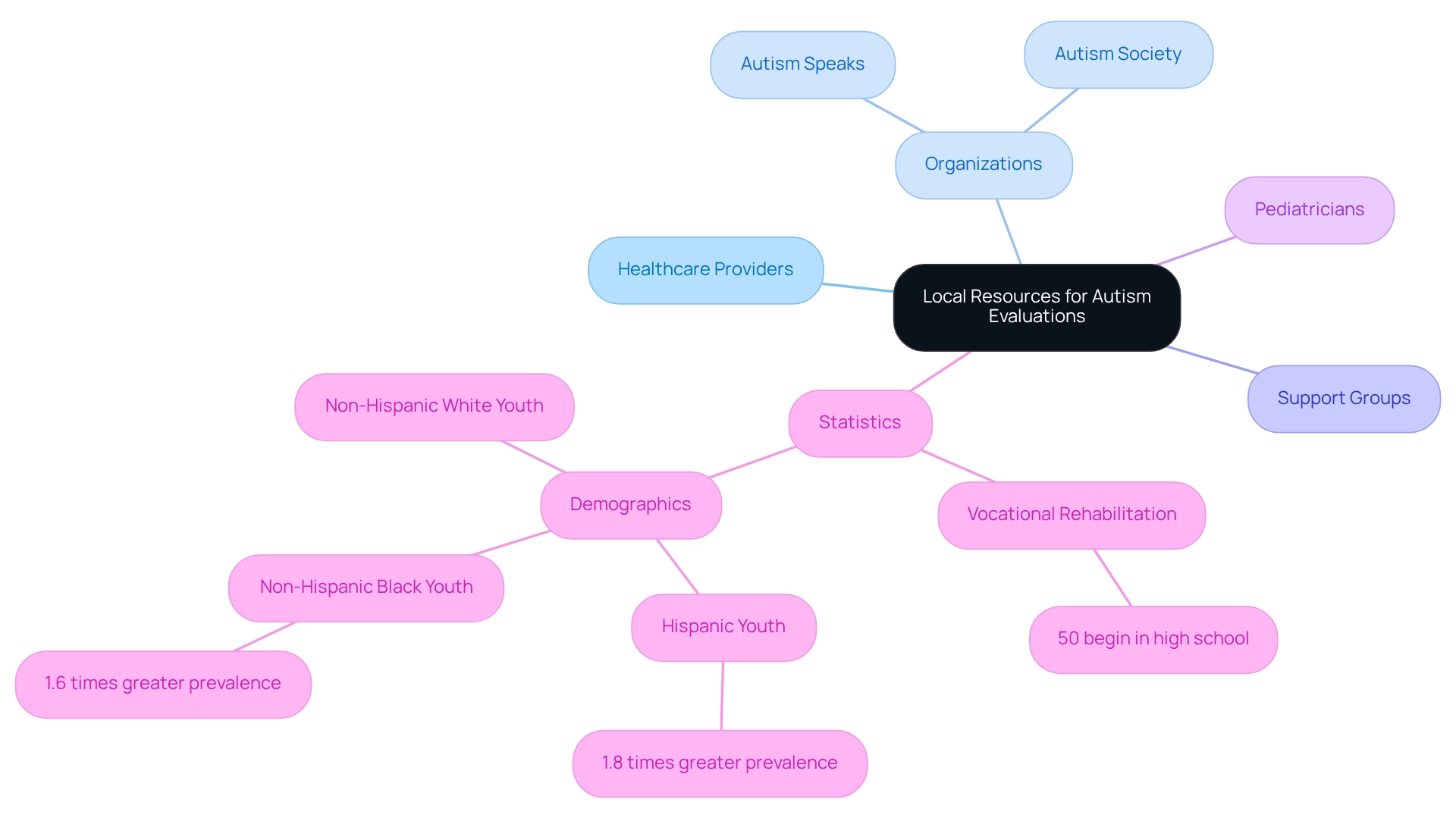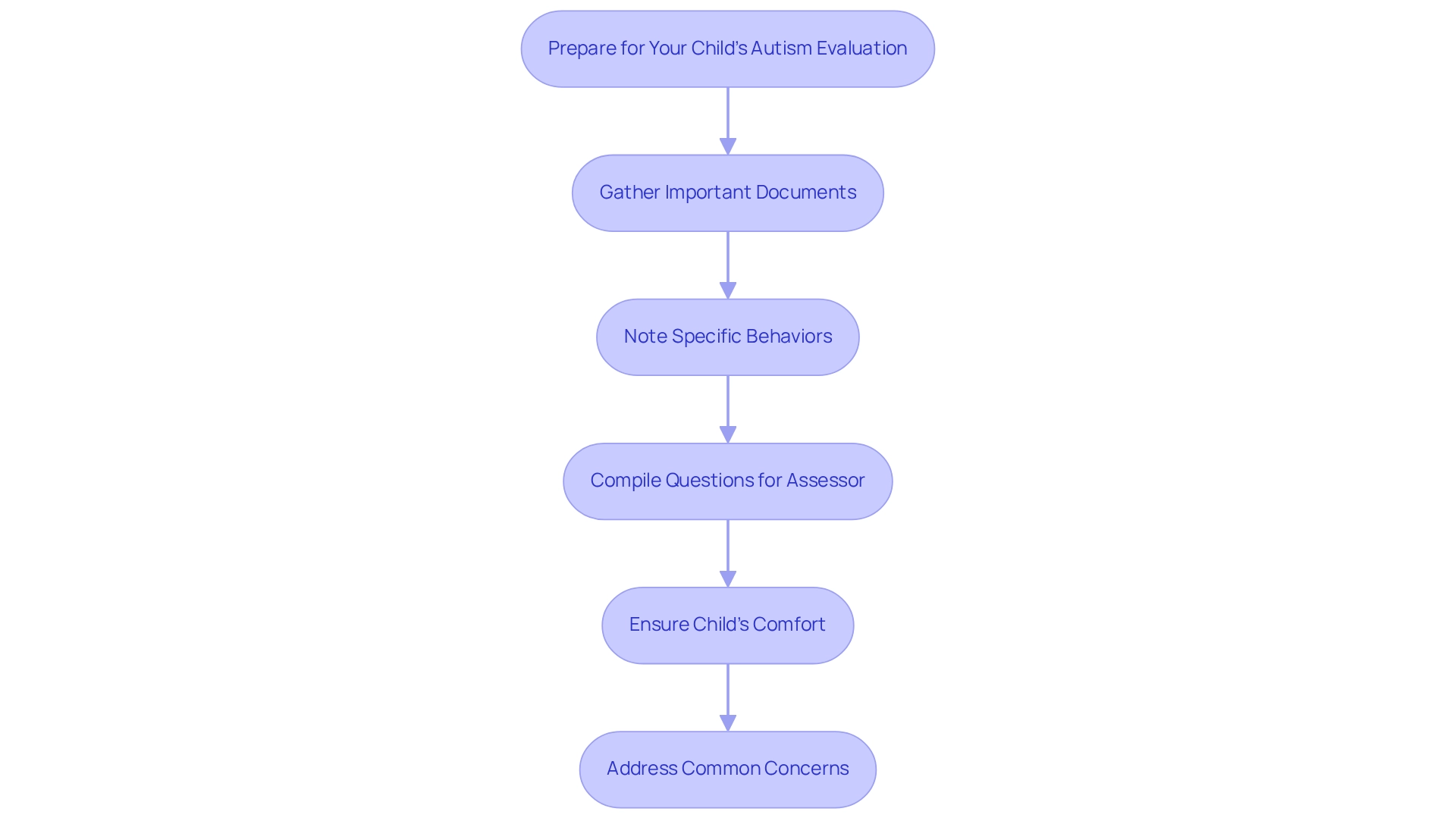Overview
This article presents a compassionate four-step process for parents seeking autism evaluations for their children. It highlights the critical importance of early diagnosis and the access to essential resources that can make a difference. By illustrating how local healthcare providers, specialized centers, and community organizations can support families, it aims to empower parents in identifying and securing the appropriate evaluations. These evaluations are vital for timely interventions, ultimately leading to improved developmental outcomes for their children.
Understanding the challenges parents face, this article encourages a proactive approach. It invites you to explore the available resources and reach out for the support you need. Together, we can navigate this journey, ensuring that your child receives the care and attention they deserve.
Introduction
Navigating the world of autism evaluations can feel both essential and overwhelming for parents seeking clarity about their child's developmental needs. These assessments are pivotal in diagnosing Autism Spectrum Disorder (ASD) and unlocking access to vital support services that can significantly enhance a child's growth trajectory. With early diagnosis linked to better long-term outcomes, understanding the evaluation process and its implications is crucial for parents.
From identifying local resources to preparing for evaluation day, this guide offers a comprehensive overview of what to expect and how to advocate effectively for a child's unique requirements. As the landscape of autism awareness continues to evolve, empowering parents with knowledge is key to ensuring that children receive the support they need to thrive. Are you ready to take the next step in this journey together?
Understand the Importance of Autism Evaluations
Assessments for Autism are crucial in determining whether a young person has Autism Spectrum Disorder (ASD). Early diagnosis often leads to timely interventions, which can significantly enhance developmental outcomes. By recognizing the importance of autism evaluations near me, parents can identify signs of autism and obtain professional assessments. These assessments offer vital insights into a child's behaviors, communication styles, and sensory sensitivities, empowering parents to advocate effectively for their child's needs. Additionally, obtaining a formal diagnosis can unlock access to various support services, educational resources, and therapies tailored to the individual's unique requirements. Focusing on assessments for developmental disorders ensures that young individuals receive the essential assistance they need to thrive.
Research indicates that early identification can lead to improved long-term outcomes for those with developmental disorders. For example, a significant percentage of autistic youth in the U.S. who receive vocational rehabilitation begin those services during high school, emphasizing the importance of early intervention. As highlighted by Patrick ME in the MMWR Surveillance Summary, 'Prevalence and Early Identification of Autism Spectrum Disorder Among Children Aged 4 and 8 Years,' there is a critical need for early identification to facilitate timely support. Furthermore, public health reports stress the necessity for equitable diagnostic and treatment services, particularly for underidentified groups, as outlined in the case study 'Public Health Action for ASD Services.' By recognizing the essential role of assessments related to developmental disorders, parents can take proactive steps to secure a brighter future for their children. After acknowledging the significance of these evaluations, it is important for parents to consider reaching out to local experts for autism evaluations near me to arrange assessments and explore available resources.
Identify Local Resources for Autism Evaluations
Finding autism evaluations near me for developmental disorders can feel overwhelming, but remember, you are not alone. Start by exploring local healthcare providers, clinics, and specialized centers that provide autism evaluations near me to cater to your child's needs. Organizations like Autism Speaks and the Autism Society offer extensive listings of professionals and services, including autism evaluations near me, that are tailored for individuals on the spectrum. Engaging with local support groups or community organizations focused on autism can provide valuable recommendations based on personal experiences. Have you considered consulting your child's pediatrician? They can often refer you to qualified specialists who understand the unique challenges faced by families, particularly when seeking autism evaluations near me, so prioritize centers that utilize standardized assessment tools like the Autism Diagnostic Observation Schedule (ADOS). This ensures a comprehensive evaluation for your child. It's equally important to inquire about the qualifications and experience of the evaluators, as this can significantly impact the quality of care your child receives.
Statistics reveal that 50% of autistic youth in the U.S. who receive vocational rehabilitation begin those services in high school. This underscores the importance of timely autism evaluations near me and subsequent interventions. Additionally, the Autism Data Visualization Tool provides insights into how ASD data is collected and represented, enhancing your understanding of prevalence and characteristics related to the condition. This tool can aid in effective communication of ASD data, facilitating better decision-making and resource allocation for autism-related services.
A recent study highlighted a concerning trend: ASD occurrence was 1.8 times greater among Hispanic youth and 1.6 times greater among non-Hispanic Black youth compared to non-Hispanic White youth. This emphasizes the necessity for accessible autism evaluations near me across diverse communities. Remember, seeking help is a vital step towards ensuring your child receives the support they deserve.

Prepare for Your Child's Autism Evaluation
Preparing for your child's autism evaluations near me is a crucial step that can significantly influence the outcome. Begin by gathering important documents, including your child's medical history, developmental milestones, and any previous assessments. Take note of specific behaviors or concerns you've observed, as this information will be invaluable during the assessment.
It’s also helpful to compile a list of questions for the assessor about the assessment process and what to expect during autism evaluations near me, including familiarization with common assessment tools such as structured interviews and observational assessments that are often used. For example, the Autism Observation Scale for Infants (AOSI) is a well-regarded tool that aims to identify signs of autism in infants through play-based activities, showing varying sensitivity across ages, particularly excelling at 18 months. The Leiter test-retest reliability ranges from 0.70 to 0.88, indicating a strong consistency in the assessments utilized for autism evaluations near me.
On the day of the assessment, ensure your child feels comfortable by bringing their favorite toys or comforting items to help alleviate any anxiety. Addressing common concerns, such as the length of the assessment and the types of questions that may arise in autism evaluations near me, can also help ease worries. As noted by Penner et al., a multi/interdisciplinary assessment approach is not always covered by third-party payors, which can raise accessibility concerns for some families.
Remember, a well-prepared strategy not only supports your child but also fosters a collaborative environment with the assessors, ultimately enhancing the assessment experience. At ASD Media, we are dedicated to creating a supportive community that empowers parents and professionals as they navigate these challenges together.

Know What to Expect During the Evaluation
As parents embark on the journey of autism evaluations near me, they can anticipate a thorough review that encompasses interviews, questionnaires, and direct observations of their child. Evaluators will gently inquire about your child's developmental history, behaviors, and any specific concerns you may have. Standardized tools are often utilized to assess communication skills, social interactions, and play behaviors. Typically, the assessment process can extend over several hours and may require multiple sessions tailored to your child's unique needs. This comprehensive approach is crucial for gathering detailed information that supports an accurate diagnosis.
After the assessment, the assessor will compassionately discuss the results with you, outlining potential next steps that include personalized recommendations for treatments or interventions aligned with your child's distinct needs. Importantly, studies reveal that nearly 25% of school-age autistic children show positive outcomes across all developmental domains by age 10, underscoring the importance of early and effective autism evaluations near me. Moreover, as Yolande Loftus points out, there are disparities in ASD prevalence among different demographics, with rates being 1.8 times higher among Hispanic children and 1.6 times higher among non-Hispanic Black children compared to their non-Hispanic White peers. This reality emphasizes the need for awareness and tailored strategies in the assessment process. Additionally, research indicates that many autistic children face coexisting conditions such as anxiety, ADHD, and sleep difficulties, which can complicate their developmental journey. Recognizing these challenges is vital, as it reinforces the significance of a thorough evaluation that considers all facets of a child's health and development.
We encourage you to share your experiences and thoughts in the comments or through our newsletter, as your insights can foster a supportive community for parents navigating similar paths.
Conclusion
Navigating autism evaluations is an essential journey for parents striving to secure the best outcomes for their children. By grasping the importance of these assessments, parents can empower themselves to seek timely interventions that are crucial for developmental success. Early diagnosis not only opens doors to vital resources and therapies but also enhances long-term growth trajectories, highlighting the need for proactive engagement in the evaluation process.
Identifying local resources for autism evaluations is a significant step in this journey. By connecting with healthcare providers, specialized centers, and community support networks, parents can ensure they are making informed choices regarding evaluation services. Engaging with professionals who employ standardized assessment tools further guarantees that evaluations are thorough and effective, paving the way for tailored support that meets each child's unique needs.
Preparation for the evaluation day is equally important. Gathering relevant information, documenting specific concerns, and familiarizing oneself with assessment tools can greatly influence the evaluation experience. Creating a comfortable environment for the child and addressing any apprehensions can help foster a positive atmosphere for collaboration with evaluators.
Ultimately, understanding what to expect during the evaluation process equips parents with the knowledge necessary to advocate effectively for their children. The comprehensive nature of these assessments ensures that all facets of a child's development are considered, leading to informed recommendations for interventions. By prioritizing autism evaluations, parents can take vital steps toward unlocking the support and resources essential for their child's success in navigating the challenges of Autism Spectrum Disorder.
Frequently Asked Questions
Why are assessments for autism important?
Assessments for autism are crucial for determining whether a young person has Autism Spectrum Disorder (ASD). Early diagnosis can lead to timely interventions, significantly enhancing developmental outcomes.
How can parents benefit from autism evaluations?
Parents can identify signs of autism and obtain professional assessments through autism evaluations. These assessments provide vital insights into a child's behaviors, communication styles, and sensory sensitivities, empowering parents to advocate effectively for their child's needs.
What advantages come with obtaining a formal autism diagnosis?
A formal diagnosis can unlock access to various support services, educational resources, and therapies tailored to the individual's unique requirements.
What does research say about early identification of autism?
Research indicates that early identification can lead to improved long-term outcomes for those with developmental disorders. Many autistic youth in the U.S. who receive vocational rehabilitation begin those services during high school, highlighting the importance of early intervention.
What is the significance of public health reports regarding autism assessments?
Public health reports stress the necessity for equitable diagnostic and treatment services, particularly for underidentified groups, emphasizing the critical need for early identification to facilitate timely support.
What steps should parents take after recognizing the importance of autism assessments?
Parents should consider reaching out to local experts for autism evaluations to arrange assessments and explore available resources, ensuring that their children receive the essential assistance they need to thrive.




